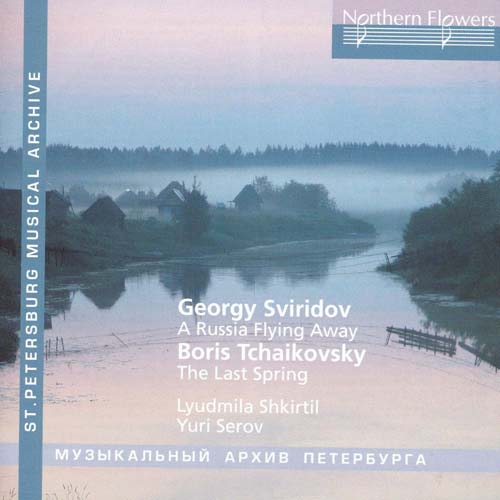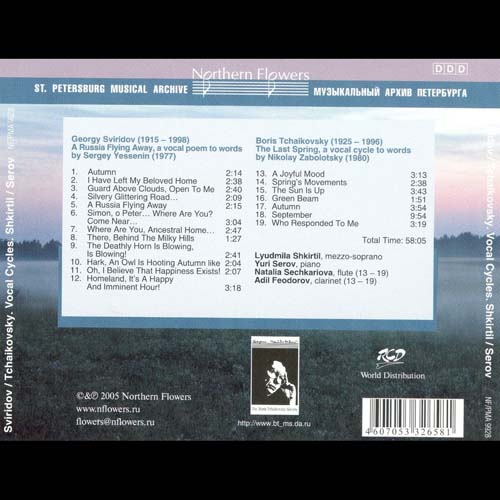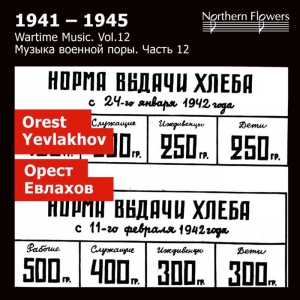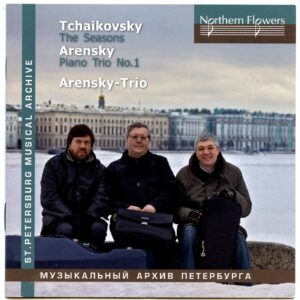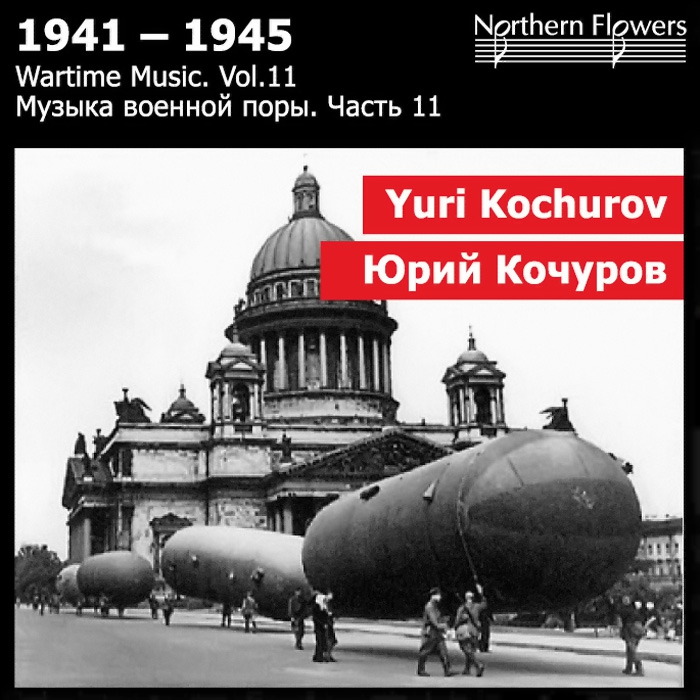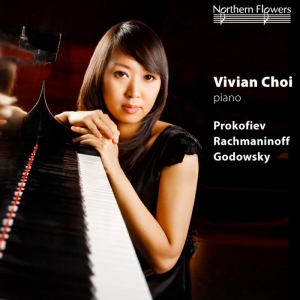Description
Lyudmila Shkirtil, mezzo–soprano
Yury Serov, piano
Natalia Sechkariova, flute (13–19)
Adil Feodorov, clarinet (13–19)
Recorded at the St. Catherine Lutheran Church, St. Petersburg, June 11, 2004 (13–19),
January 25, 2005 (1–12).
Sound recording and supervision: Alexey Barashkin.
Text: Northern Flowers
English text: Sergey Suslov.
Cover design: Anastassiya Evmenova & Oleg Fakhrutdinov
| Georgy Vasilievich Sviridov (1915 – 1998) A Russia Flying Away (1977), a vocal poem to words by Sergey Yessenin |
||
|
1. |
Autumn |
2:14 |
|
2. |
I Have Left My Beloved Home… |
2:38 |
|
3. |
Guard Above Clouds, Open To Me… |
2:40 |
|
4. |
Silvery Glittering Road |
2:09 |
|
5. |
A Russia Flying Away |
2:15 |
|
6. |
Simon, o Peter… Where Are You? Come Near… |
3:04 |
|
7. |
Where Are You, Ancestral Home… |
2:47 |
|
8. |
There, Behind The Milky Hills |
1:27 |
|
9. |
The Deathly Horn Is Blowing, Is Blowing! |
2:41 |
|
10. |
Hark, An Owl Is Hooting Autumn like |
2:04 |
|
11. |
Oh, I Believe That Happiness Exists! |
2:07 |
|
12. |
Homeland, It’s A Happy And Imminent Hour! |
3:18 |
| Boris Alexandrovich Tchaikovsky (1925–1996) The Last Spring, a vocal cycle to words by Zabolotsky |
||
|
13. |
A Joyful Mood |
3:13 |
|
14. |
Spring’s Movements |
2:38 |
|
15. |
The Sun Is Up |
3:43 |
|
16. |
Green Beam |
1:51 |
|
17. |
September |
3:54 |
|
18. |
Autumn |
9:54 |
|
19. |
Who Responded To Me |
3:19 |
|
Total Time: |
58:05 |
|
| We present for your attention two impressive vocal cycles of the second half of the 20th century written at approximately the same time by two great Russian composers, Georgy Sviridov and Boris Tchaikovsky. For all their striking individuality, these authors have very much in common. It is first of all their close ties to the national art, reliance on classical traditions, and creative attitudes that are extremely organic and integral. Both Sviridov and Tchaikovsky combine Innovations and originality with refined, perfected simplicity as a result of careful selection of their tools of expression. They both composed as if ignoring fashionable trends in music; they listened to their own tuning fork. And both addressed in their work the deepest and most difficult experiences that Russia had to face in the twentieth century. |
| Georgy Sviridov and A Russia Flying Away |
| Georgy Vasilievich Sviridov was born in Kursk Oblast in 1915. His initial education in music was at the musical school of Kursk, after which he studied at the First Musical Vocational College in Leningrad in 1932–1936. |
| His debut was a cycle of songs to words by Pushkin in 1935. Already these early works quite clearly demonstrate catchy melodies, fresh melodies, and simple texture typical for Sviridov. |
| In 1936 he entered Leningrad Conservatory to study with Dmitry Shostakovich. Sviridov’s compositions of the Forties reveal a strong influence of the teacher from whom he learned much, both as a composer and as a person. |
| The composer lived in Moscow from 1956 till his last day. |
| The Soviet regime was benevolent to Sviridov. He was honored with numerous top awards and titles such as the Lenin Prize and the titles of National Artist of the USSR and Hero of Socialist Labor. For several years, he headed the Composers’ Union of the Russian Federation. |
| The composer’s heritage of Sviridov includes music to musical comedies, films, and theatrical productions, such monumental symphonic vocal frescoes as Poem In Memoriam of Sergey Yessenin, Passionate Oratorio, and Songs of Kursk, cantatas for chorus and orchestra, symphonic suites, compositions for chorus a cappella, instrumental ensembles, pieces for piano, and several hundreds of songs. |
| Sviridov’s place in the history of Russian music is primarily that of an author of vocal compositions. The artistic credo of composer was careful attention to poetic word, the inner symbolic sense of which is to be disclosed in music. The theme of Russia in the broadest sense, and the image of homeland at the landmarks of history run through Sviridov’s works as his innermost idea. |
| A Russia Flying Away, a vocal poem to words by Sergey Yessenin, was written in 1977. One had to have a real courage and inner freedom to give such a title to a composition in the “Developed Socialism” era. |
| Yessenin has no poem of this name. Sviridov’s title is a quotation from the poem The Dove of Jordan, “A swan is flying ahead/Eyes full of grove–great grief/Is it not you weeping in the sky,/A Russia that’s flying away?“ The composer mostly selects verses of the young poet written in the years of a monstrous crisis (1917) and collapse of all the ideals and values of patriarchal Russia. Sviridov who had a rare sense of poetry shows us a totally strange Yessenin — nothing commonplace, and almost nothing of the Yessenin we had got accustomed to. It may even be said that the composer discovered this great Russian poet for us as something quite new. He created an amazing declaration of love for Homeland full of lament for the irrevocable, and delight in the beauty of the land — full of warmth, poetry, mysticism, faith, and chiming bells. |
| The composition based on fragmentary pieces of poetry is ultimately integrated in its form. The binding element is in the inner emotional contrast supported by a common motif line. Several symbolic images cemented with a generalizing idea alternate around one central symbol. Nearly all the tracks in the cycle follow one another without a break. Such architecture is very typical for the stylistics of “late” Sviridov, and relates A Russia Flying Away to painting, to the composition of a Russian icon. |
| This is how the author himself comments his musical poem in his diaries: “Autumn” and “I Have Left My Beloved Home”, landscape and lyric; “O Guard Above Clouds, Open To Me” is a fabulous legendary steed, a symbol of poetical creativity; “Silvery Glittering Road…” symbolize the timeless path of an artist, the path of man; “A Russia Flying Away” is Russia depicted as a flying bird, a swan on the wing, Russia in its cosmic flight; “O Simon, o Peter… Where Are You? Come Near…” is a fragment of an ancient legend; “Where Are You, Ancestral Home…” is a picture of revolutionary upheavals, and ruin of home; “There, Behind The Milky Hills” is the space where ancestors’ souls fly in the whirlwind of cosmic fire; “The Deathly Horn Is Blowing, Is Blowing!” is the advent of the iron guest, a tragic monologue, a feeling of collapse of the archetypal peasant way of life; “Hark, An Owl Is Hooting Autumnlike” is the poet again, eternity of poetry, eternity of the poet’s advent; “Oh, I Believe That Happiness Exists!” and „O Homeland, It’s A Happy And Imminent Hour!” are limitless belief in Motherland, in its best spiritual powers, a solemn anthem, and belief in recovery of Homeland.” |
| Along with colossal late vocal cycles of Shostakovich, A Russia Flying Away by Georgy Sviridov may be named among the most inspired pages of the 20th century Russian music. The composition challenging its performer with unbelievable difficulties in technique and musicianship is rightly considered to be a cornerstone of the last century’s vocal repertoire. |
| Boris Tchaikovsky and The Last Spring |
| Boris Alexandrovich Tchaikovsky (1925 – 1996) was born in Moscow into a white–collar family: his father was an expert in statistics and economic geography, and his mother was a medic. The parents were talented individuals who knew literature and art well, and passionately loved music. The ethical principles inherited from the parents became the composer’s lifelong inner core. |
| Boris Tchaikovsky finished school, and the Gnessin College, and entered Moscow Conservatory in 1941, but his studies were interrupted by the war, and were not resumed until 1944. His Conservatory teachers were the eminent Vissarion Shebalin, Nikolai Myaskovsky, and Dmitry Shostakovich (Composition), and Lev Oborin (Piano). |
| Upon graduation from the Conservatory in 1949, Boris Tchaikovsky found a job of a radio editor. In 1952 he decided to leave the job to devoted himself to composition of music. In 1969, Boris Tchaikovsky was awarded the USSR State Prize for his fundamental Second Symphony; in 1985, he was made National Artist of the USSR. In the last years of his life, 1989 till 1996, Boris Alexandrovich taught at the Russian Gnessin Academy of Music as Professor of Composition. |
| The creative heritage of Boris Tchaikovsky is vast. The composer wrote four symphonies, a Symphoniette, a Chamber Symphony, concertos for clarinet, cello, violin, and piano with orchestra, six string quartets, numerous chamber pieces, vocal cycles, and soundtracks to more than 30 films. |
| In 1958, not long before his death, Nikolai Zabolotsky wrote the poem Don’t Let Your Soul Be Lazy, which later became famous, a kind of manifesto for a whole generation of “the 60s people” and an indispensable essay theme in any secondary school program in the Soviet Union. It would be hard to find an artist who has more keenly responded to these amazing lines in their works than Boris Tchaikovsky. Incessant labor of his ample heart, desire to perceive, to study the complicated and contradictory human nature, mysterious and inexhaustible depths of human soul; honesty and sincerity in life and creative work, and great mastery have made the name of Boris Tchaikovsky a synonym of high ideals in the art of music. And it is satisfying to see that interest in his music is growing worldwide year after year. |
| The Last Spring, a vocal cycle to words by Zabolotsky, was written in 1980. The composition was preceded by a long pause in the activity of Boris Tchaikovsky. Four years separate it from his previous works, a period when he wrote nothing but soundtracks to a few films. The Sevastopol Symphony and The Last Spring that appeared in 1980 marked a new phase in the composer’s work, a crystallization of his style and manner. Like a drop of clear water, The Last Spring reflected Boris Tchaikovsky’s most essential composing achievements and attainments. |
| Nikolai Zabolotsky (1903–1958) is a separate “solar system” of the 20th century Russian poetry. The bright imagery of his poems, their enchanting beauty and depth, and light, weightless style have raised him to the galaxy of Russia’s best poets. The poetry of Zabolotsky may be divided into two strictly delineated periods: the early period of denial of the classical “Pushkinian” tradition of Russian literature — and the later, mature one, when Zabolotsky, in a way, “revived” or brought back the spirit and style of classical Russian poetry. Zabolotsky surely was the poetic voice of the epoch. “Innovatorship” proved to be too “superficial” for the disasters and emotional stresses that his generation had to go though. In the proper sense of the word, he achieved the poetical harmony and simplicity of his last creative years through suffering — in his creativity, and even in his life (many years in Stalin camps and frustration in his private life of the last years.) |
| Boris Tchaikovsky selected mostly the latest Zabolotsky’s poems for his cycle, and builds a moving philosophical concept of the most essential: of life and death, love and beauty, nature and eternal flow of existence. The spiritual affinity and kindred individuality of Tchaikovsky and Zabolotsky are surprising indeed. Soulful simplicity, aspiration for beauty as the supreme harmony, love for nature and its primitive primeval mysteries, perception of man as a part of “inert” matter of the Universe, and manner of utterance, which is clad in strict classical forms, noble, and restrained, link the two authors. |
| Being a great master of the chamber instrumental genre, the composer builds the vocal cycle according to the “suite” principle, alternating episodes (parts) of different nature. Tchaikovsky “embellishes” the score of The Last Spring with voices of flute and clarinet. It is just embellishing, not an attempt for an ampler scope of the sound, nor an inclination to a symphonic turn. The instruments just add some colors and bring in some charm of diversity, but they never take over the leading function. |
| The first parts of the cycle: A Joyful Mood, Spring’s Movements, The Sun Is Up, and Green Beam, create a bright, elated atmosphere, they “breathe” optimism and belief in man and his ability to improve. The springtime awakening of nature, tiresome waiting for the warmth of the sun, musical pictures of the fairytale forest and the “white–domed town” are depicted tersely, vividly, and very poetically. The music texture is transparent, and the language of the harmonies is remarkable for its fresh and rich fantasy. |
| The fifth and the sixth part are about the advent of autumn followed by “sobering” sorrow. Autumn, the cycle’s earliest poem written in 1932, in the time of Zabolotsky’s strong enthusiasm for “natural philosophy”, is interpreted by the composer with a very personal accent as the life’s sunset, as a stupor, as a stop on a long way. Autumn is without doubt the culmination of the whole cycle in its scale as well as in the size of musical information conveyed. Autumn is the only part of The Last Spring developing to the dramatic continuity rule. Tchaikovsky makes Zabolotsky’s somewhat cold poem warmer, viewing it in the light of thoughts of man’s loneliness and alienation from the live world of nature. |
| The last part, Who Responded To Me (a direct lyrical address rare for Zabolotsky) is a soft, poetical parting with spring, youth, and love full of warmth and beauty. The bright nature of the last bars in the instrumental trio postlude offers no consolation: happiness is too fragile and achievable. |
|
„Северные цветы“
|
|
Natalia Sechkariova, flute
|
|
Ms. Sechkariova graduated from St. Petersburg Conservatory and finished her postgraduate studies with Professor G. Nikitin in 1990. Two years before, she became a winner of a prestigious international competition in Barcelona. Since 1989 she has been soloist of the Academic Symphony Orchestra of St. Petersburg Philharmonic, with which she has performed at the best venues of over thirty countries.
|
|
Natalia Sechkariova actively performs both solo and in ensembles. She has appeared at such festivals as Musical Spring in St. Petersburg, From Avant–Garde to Our Days, and Ways of Sound, and performed concertos for flute and orchestra with St. Petersburg’s best ensembles.
|
|
Ms. Sechkariova regularly records CDs, and teaches at St. Petersburg Conservatory.
|
|
Adil Fyodorov, clarinet
|
|
In 1971, immediately after graduation cum laude from the Rimsky–Korsakov Conservatory, Adil Fyodorov became soloist of the Leningrad (St. Petersburg) Philharmonic Symphony Orchestra, and soon rose to the clarinet group leader. Mr. Fyodorov has performed with the Orchestra, in various chamber ensembles, and as soloist in the best concert halls of Russia, and has toured in over 30 countries.
|
|
Adil Fyodorov is recognized in St. Petersburg as a chamber ensemble virtuoso. He has performed with N. Gutman, A. Lyubimov, Z. Vinnikov, B. Pergamenschikov, and A. Ugorsky, has recorded many CDs. Currently, he is a professor at the Rimsky–Korsakov Conservatory in St. Petersburg.
|
|
A Russia Flying Away to words by Sergey Yessenin
|
|||
|
|
||
|
The Last Spring to words by Zabolotsky (1980)
|
|||
|
|
||

